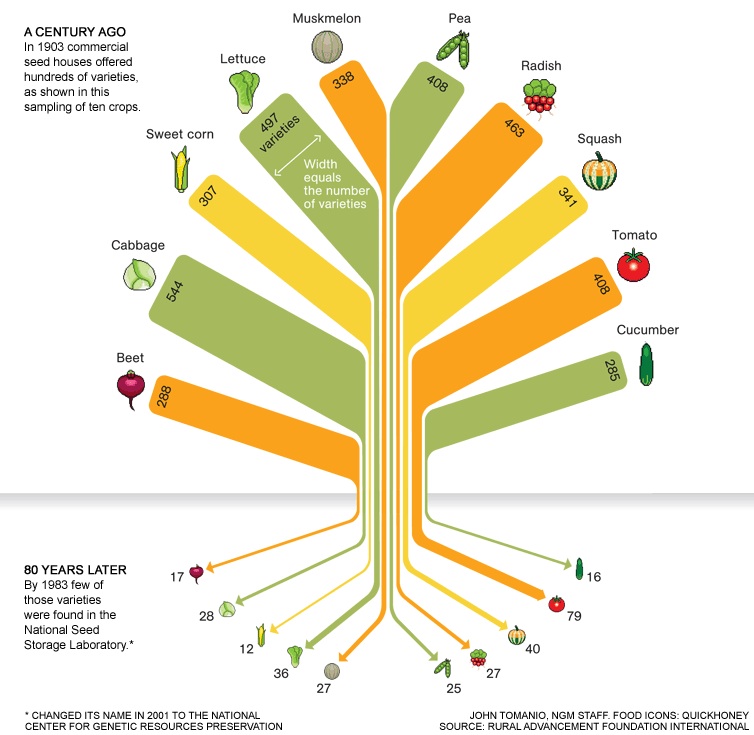Seed Saving: Difference between revisions
Siterunner (talk | contribs) No edit summary |
Siterunner (talk | contribs) No edit summary |
||
| Line 95: | Line 95: | ||
[[Category:Extinction]] | [[Category:Extinction]] | ||
[[Category:Farm-Related Policies]] | [[Category:Farm-Related Policies]] | ||
[[Category:Food-Related Policies]] | |||
[[Category:Genetic Engineering]] | [[Category:Genetic Engineering]] | ||
[[Category:Land Ethic]] | [[Category:Land Ethic]] | ||
Revision as of 13:58, 16 June 2015
https://en.wikipedia.org/wiki/Seed_saving
http://www.greenpolicy360.net/w/File:Seed_diversity-varieties.jpg
http://www.fastcodesign.com/1669753/infographic-in-80-years-we-lost-93-of-variety-in-our-food-seeds
http://ngm.nationalgeographic.com/2011/07/food-ark/food-variety-graphic
○ ○ ○ ○
Industrial Agriculture -- Benefits and Consequences
Quick Review of "The Debate" -- Diversity v Monoculture, Seed Saving v Seed Patents, Productivity & Sustainability, a GMO/patented seed, high input, chemically intensive, pesticide/petrochemical regimen and/or...
http://www.ucsusa.org/our-work/food-agriculture/our-failing-food-system/industrial-agriculture
○
"Bitter Seeds" / 2012 - http://grist.org/industrial-agriculture/bitter-seeds-documentary-reveals-tragic-toll-of-gmos-in-india/
○
August 25, 2014
http://www.newyorker.com/magazine/2014/08/25/seeds-of-doubt - Vandana Shiva
"There are two trends,” she told the crowd that had gathered in Piazza Santissima Annunziata, in Florence, for the seed fair. “One: a trend of diversity, democracy, freedom, joy, culture—people celebrating their lives... And the other: monocultures, deadness... We would have no hunger in the world if the seed was in the hands of the farmers and gardeners and the land was in the hands of the farmers..."
Shiva, along with a growing army of supporters, argues that the prevailing model of industrial agriculture, heavily reliant on chemical fertilizers, pesticides, fossil fuels, and a seemingly limitless supply of cheap water, places an unacceptable burden on the Earth’s resources. She promotes, as most knowledgeable farmers do, more diversity in crops, greater care for the soil, and more support for people who work the land every day. Shiva has particular contempt for farmers who plant monocultures—vast fields of a single crop. “They are ruining the planet,” she told me. “They are destroying this beautiful world.”
The global food supply is indeed in danger. Feeding the expanding population without further harming the Earth presents one of the greatest challenges of our time, perhaps of all time.
Few technologies, not the car, the phone, or even the computer, have been adopted as rapidly and as widely as the products of agricultural biotechnology. Between 1996, when genetically engineered crops were first planted, and last year, the area they cover has increased a hundredfold—from 1.7 million hectares to a hundred and seventy million. Nearly half of the world’s soybeans and a third of its corn are products of biotechnology... Between 1950 and the end of the twentieth century, the world’s grain production rose from seven hundred million tons to 1.9 billion, all on nearly the same amount of land...
The "Green Revolution" relied heavily on fertilizers and pesticides, but in the nineteen-sixties little thought was given to the environmental consequences...
To feed ten billion people, most of whom will live in the developing world, we will need what the Indian agricultural pioneer M. S. Swaminathan has called “an evergreen revolution,” one that combines the most advanced science with a clear focus on sustaining the environment. Until recently, these have seemed like separate goals...
Shiva and other opponents of agricultural biotechnology argue that the higher cost of patented seeds, produced by giant corporations, prevents poor farmers from sowing them in their fields...
○
June 15, 2015
Vandana Shiva is a well known environmental activist, eco-feminist, and anti-GMO campaigner. Time Magazine in 2003 called her an environmental hero and one of Asia's most powerful communicators.
Shiva has her critics, however. A long article in the New Yorker by Michael Specter is a recent example of criticism of her work, although it also acknowledges contributions she has made to the environmental movement. A response to the article by Counter Punch by Louis Proyect calls the article a "hatchet job" but that seems overly harsh. Specter makes a number of valid criticisms of Shiva. I have always had doubts about Shiva even though I agree with many of her positions. For example, I oppose the patents on GMO and the restrictions on farmers reusing the seed. However, the problem of patents applies to many areas. Patent protection adds huge costs to health plans because many drugs are patented and companies can charge whatever the market will bear with no fear of competition...
○
August 20, 2014
So Right and So Wrong
http://grist.org/food/vandana-shiva-so-right-and-yet-so-wrong/
Romantic environmentalists tend to get the big-picture problems right, while fudging the details. Rationalists nail the details, but sometimes become so immersed in the minutiae that they lose sight of the big picture.
Michael Specter’s New Yorker profile of Vandana Shiva, the environmentalist and crusader against globalization and Big Agriculture, is a portrait of someone who understands the big-picture concerns of green-inclined young people with great clarity...
There’s a real danger when a big-picture romantic fixates on one particular devil as the root of all problems. Among activists trying to raise awareness about a problem, fudging details is commonplace and, maybe, inevitable. But if you are proposing solutions, it’s important to get the facts right...
○
EcoWatch
http://ecowatch.com/2015/03/25/vandana-shiva-earth-at-risk/
http://ecowatch.com/2015/02/16/vandana-shiva-life-depends-soil/
2015 is the year of soil. Bringing the soil to the center of our consciousness and our planning is vital for the life of the soil, but also for the future of our society. History provides ample evidence that civilizations which ignored the health and well-being of the soil, and exploited it without renewing its fertility, disappeared along with the soil.
○ ○ ○ ○
PR and "the Debate"
http://gawker.com/heres-how-conde-nast-and-mo-rocca-are-making-propaganda-1616500527
